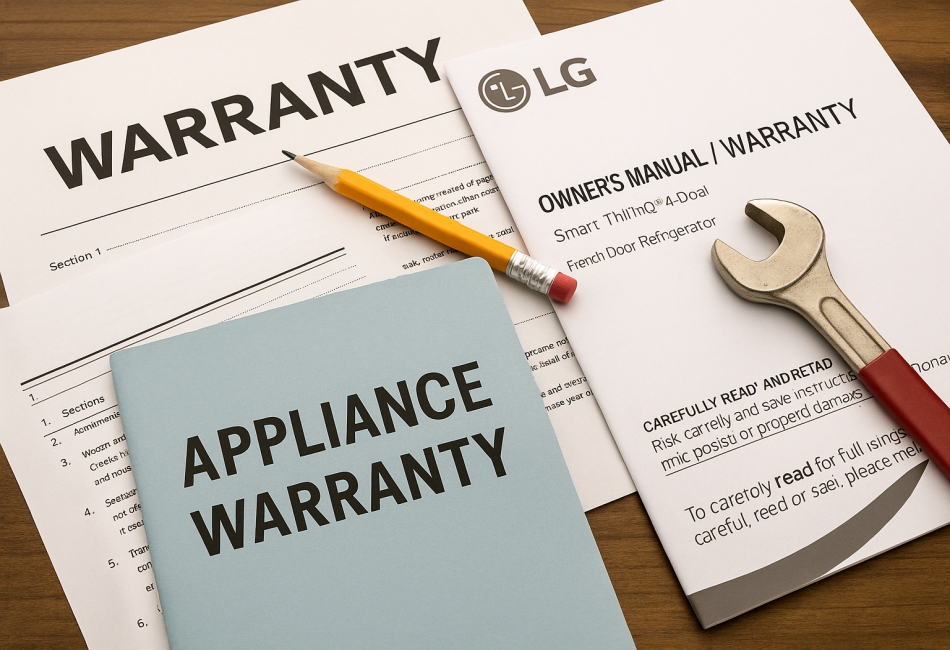Warranties are one of the first things customers ask me about when their appliance breaks down. And rightly so—these policies can save you hundreds of dollars if you understand what’s covered and how to use them properly. Over the years, I’ve dealt with every kind of warranty: from factory coverage on brand-new ovens to extended protection plans on aging washing machines. Unfortunately, many homeowners misunderstand what their warranty actually includes—and that can lead to delays or even denied claims. Knowing the basics helps you make smarter, faster decisions when something goes wrong.
Types of Appliance Warranties
There are typically two main types of warranties you’ll run into. First, you’ve got the manufacturer’s warranty, which is usually included in the purchase price. It covers defects in materials or workmanship, usually for one year. Then there are extended warranties or protection plans, which you buy separately. These often include more services, but they also come with more fine print. I’ve worked with both, and I can tell you: coverage can vary a lot depending on the brand and provider. Some companies even have different warranty terms for parts and labor, which trips people up all the time.
What’s Typically Covered—and What’s Not
Most warranties don’t cover wear and tear or user damage. If your dishwasher’s control board fails because of a factory defect, that’s usually covered. But if it floods because the filter wasn’t cleaned for months, that’s likely not. But in any case, dishwasher repair will fix this problem. One customer I helped had a fridge with a faulty compressor—good news, the part was under warranty. Bad news, the labor wasn’t, and they weren’t expecting that bill. It’s these kinds of details people often miss. Also, warranties rarely cover cosmetic damage. So if your oven still works but has a cracked panel, you’re probably on your own.
Common Situations I’ve Seen
One of the more frustrating things I’ve seen is when people assume any breakdown is covered. I once visited a home where a dryer had stopped heating. They told me the warranty should handle it. After some testing, it turned out the vent was so clogged the unit had overheated. Not only was that not covered, but the entire unit had suffered damage. That situation could have been avoided with routine maintenance. Always check your warranty terms and keep your appliances in good working condition—they’re more likely to honor your claim.
Don’t Void Your Warranty Without Knowing
A big issue is self-repair. I’ve walked into countless jobs where a customer already opened up the unit and tried to “figure it out.” That’s risky—not only because modern appliances involve complex electronics and potential shock hazards, but also because unauthorized tampering often voids the warranty. If you’re dealing with a sealed system or electrical fault, it’s best not to touch anything. I always remind people that what looks like a simple fix can easily escalate. At Superior Appliance Service https://superiorapplianceservice.ca/, we make sure repairs meet warranty standards, so your coverage remains intact.
How to Use Your Warranty Wisely
If your appliance is under warranty, document everything. Keep your original purchase receipt and any service records. If your appliance starts acting up, don’t wait for it to completely fail. Call the service line, describe the issue in detail, and find out what documentation is required. In my experience, the quicker you report a problem, the more likely you’ll get approval. And always use a technician authorized by the warranty provider. If not, your claim may be denied—even if the fix was legit.
Final Thoughts
Appliance warranties are valuable, but only if you understand their limits. They won’t fix every problem, and they won’t always cover the entire bill. But when used correctly, they offer real peace of mind. Most of all, never try to repair complicated machines yourself. It’s not just about voiding your coverage—it’s about staying safe. One wrong move around a high-voltage circuit, and the consequences could be serious.
Professional services like Superior Appliance Service not only diagnose and fix your issue quickly, but they also ensure the work won’t compromise your warranty. A trained technician knows how to balance technical repairs with policy requirements. That’s not something you want to leave to chance.
